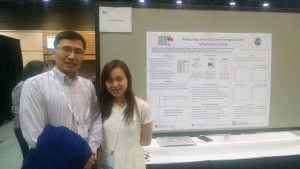Summer Research, Conference, Internship, and Beyond
 Last summer in 2016, after just completing her freshman year, Josephine Chow worked at Johns Hopkins University Information Security Institute (JHUISI) as a research assistant with Dr. Xiangyang Li. She analyzed the randomness in different network data sets in order to flag anomalies in traffic, likely caused by secret messages hidden in such traffic.
Last summer in 2016, after just completing her freshman year, Josephine Chow worked at Johns Hopkins University Information Security Institute (JHUISI) as a research assistant with Dr. Xiangyang Li. She analyzed the randomness in different network data sets in order to flag anomalies in traffic, likely caused by secret messages hidden in such traffic.
The study aims at a 6-bit TCP flag header in network packets that can be used to transmit secret messages through a special information-coding scheme, called a covert storage channel. Josephine utilized a measure of differences between TCP flag frequency distributions, called relative entropy (also called Kullback–Leibler divergence), to characterize the irregularity of an unknown network traffic stream from the baseline of regular ones. The results have shown that this method is promising and efficient. Such covert channels can be instrumental in cyber attacks, to hide traces of information leaking out or command and control communication.
Josephine is currently a sophomore at the University of Maryland, College Park. She is studying Computer Science and Mathematics in its Advanced Cybersecurity Experience for Students (ACES) honors program. In March 2017, Josephine and Dr. Li attended the annual SIGCSE Technical Symposium in Seattle, WA. She presented a research poster at its ACM undergraduate student research competition and was one of five participants, selected from 20 poster entries, to give out a presentation. The presentation is titled Raising Flags: Detecting Covert Storage Channels Using Relative Entropy. It discussed an interesting dilemma facing the secret communication accomplices that encrypting a secret message’s content actually could increase the chance for its existence to be revealed.
“Covert Storage Channels often pose a considerable threat. However, since many people do not suspect its existence and it is very hard to detect, not many researches have been done on this subject. I am truly amazed at how many people came to the poster session and learned about my research and the subject. Even though I only made it to the semi-finalist round, I had a successful poster session as a first time presenter. I was even offered an opportunity to intern at the Pacific Northwest National Laboratory. I had the opportunity to meet different respectable professors in different universities. SIGCSE was a great opportunity to learn as a first time presenter,” Said Josephine.
Josephine’s research was part of a NSF sponsored project titled Broadening the Path to the STEM Profession Through Cybersecurity Learning, a three-year effort in collaboration with the College of Charleston. Led by Dr. Li, JHUISI is designing a range of cybersecurity educational and research materials with broad reach to liberal arts students, working with faculty members and students from computer science and other schools and departments. At this year’s SIGCSE, this project was one of 20 showcases selected by NSF. For more information about this project please check out here


